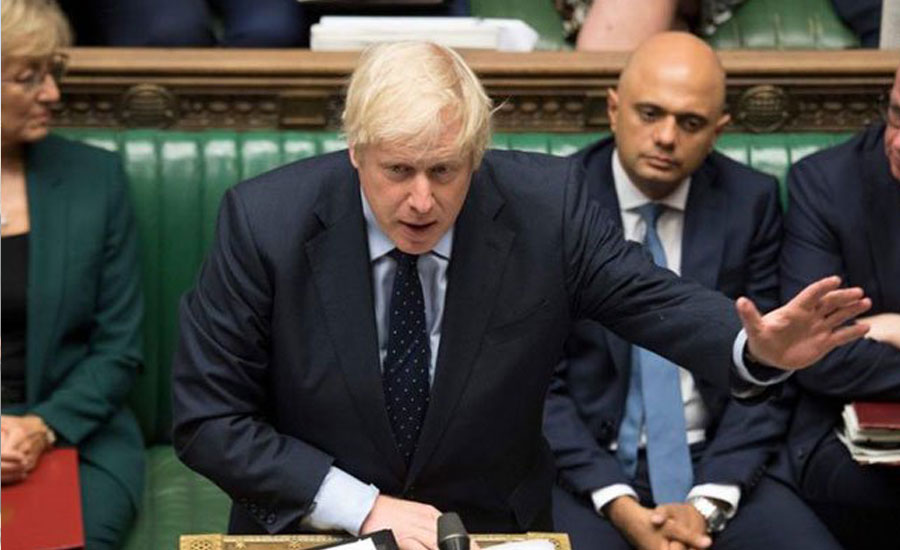SC to rule on British PM Johnson's suspension of parliament

LONDON (Reuters) - Boris Johnson illegally suspended parliament because he saw it as an obstacle to his Brexit plans, Britain’s Supreme Court (SC) was told on Tuesday as it met to decide whether the Prime Minister had unlawfully sought to by-pass lawmakers.
Johnson announced on Aug. 28 that he had asked Queen Elizabeth to prorogue, or suspend, parliament for five weeks from last week until October 14. He said the shutdown was necessary to allow him to introduce a new legislative agenda.
Opponents said the real reason was to prevent scrutiny and challenges by parliament - where he now has no majority - to his Brexit plans, especially his promise to leave the European Union by October 31 even if no divorce deal has been agreed.
Related Coverage
They want the SC, the United Kingdom’s highest judicial body, to rule Johnson’s actions were illegal and critics, including rebels thrown out of his Conservative Party over Brexit, say he should resign if that is its decision.
In a damning judgement last Wednesday, Scotland’s highest court said the suspension was unlawful and an “egregious” attempt to stymie parliament.
However, a week earlier the High Court of England and Wales rejected a similar case, saying the matter was political and not something judges should interfere in.
All 11 judges on the Supreme Court will now decide on a crucial question: how far Britain’s unwritten constitution limits the power of the prime minister and whether Johnson’s advice to the queen was therefore illegal.
“That this is a serious and difficult question of law is amply demonstrated by the fact that three senior judges in Scotland have reached a different conclusion from three senior judges in England and Wales,” said Brenda Hale, president of the Supreme Court.
“The Supreme Court exists to decide such difficult questions of law and we shall do so in accordance with our judicial oaths.”
Launching the legal challenge to Johnson’s decision - by a mixture of anti-Brexit campaigners and opposition lawmakers - David Pannick said there was strong evidence the prime minister wanted to silence parliament because he saw it as an obstacle.
No premier had abused the prorogation power in this way for at least 50 years, he told the court.
“The prime minister advised Her Majesty to prorogue parliament for a period as long as five weeks because he, the prime minister, wished to avoid what he saw as the risk that parliament would take action to frustrate or damage the policies of his government,” Pannick said.
He said it was “remarkable” Johnson had not provided a witness statement spelling out his reasons for the prorogation and that the court could therefore draw adverse inference from his failure to do so.
Johnson has said the current session of parliament was longer than any since the English Civil war in the 17th century, and that lawmakers would have plenty of time to discuss Brexit again after an EU summit on Oct. 17-18.
When asked on Friday if he had misled the queen, Johnson said: “Absolutely not”.
In a television interview broadcast on Tuesday, Johnson said he had “the greatest respect for the judiciary” but declined to say whether he would recall parliament if the ruling goes against the government.
“I think the best thing that I can do is wait and see what the judges say,” he told the BBC. The government says opponents of Brexit are using the courts to try to frustrate Britain’s departure from the bloc which was backed by Britons in a 2016 referendum.
But Pannick said the matter was not about how or if Brexit took place but to establish that the executive, the government, was the junior partner to parliament.
“The basic principle is that parliament is supreme,” he said, adding that the government had promised to comply with whatever declaration the court made.
The Supreme Court ruled against the government in a similar constitutional case in 2017 when it said ministers could not begin the formal two-year exit process without the approval of parliament. Its hearings will run until Thursday, with the verdict not expected until Friday at the earliest.
“It is important to emphasise that we are not concerned with the wider political issues which form the context for this legal issue,” Hale said.
“The determination of this legal issue will not determine when and how the United Kingdom leaves the European Union.”







